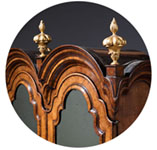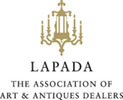A Fine 18th-century Queen Anne Burr Walnut Eight-Day Longcase Clock
Sold
Request Information
Follow Us
A Fine 18th-century Queen Anne Burr Walnut Eight-Day Longcase Clock
A superb early 18th-century eight-day Queen Anne longcase clock by the famous maker Christopher Gould, c. 1705-10.
The exquisite burr walnut veneered oak case is of the highest quality, having a square hood and a trunk door framed with walnut D-mouldings. The hood has fine sound frets and is flanked by ebonised columns with gilt wooden capitals and bases. It has viewing windows to the sides. The base, which is in perfect harmony with the hood, has shallow stepped mouldings, typical of the period and a plinth at the bottom.
The eight-day movement has going and striking trains and is in remarkably original state. The going train has anchor escapement with seconds pendulum, while the striking is regulated by an inside count wheel. The beautifully executed 12-inch brass dial has a silvered chapter ring, a subsidiary seconds ring under the XII and finely engraved date aperture above the VI in the matted centre. The chapter ring has the classic division into Roman numerals with fine half-hour markers, an inner track with quarter-hour divisions, which adds to its elegance, and Arabic five-minute divisions on the outside. It is signed along the bottom Chr Gould London. The time is indicated by a fine pair of period blued-steel hands, the hour hand richly pierced. The winding holes are ringed whilst the corners are embellished by superb putti-and-crown spandrels.
The maker
Christopher Gould was made a free Brother in the Clockmakers’ Company in1682 and referred to as great clockmaker. Strangely enough, it is not known to whom he was apprenticed, but it must have been one of the most eminent makers of the time, as Gould became a prolific and outstanding maker. He was married to Mary Rand in 1684, a second time in 1702, to Jane Cosham. The couple had several children. Gould had a great number of apprentices. Apart from longcase clocks, for which he was most famous, he also made bracket clocks, lantern clocks, even for the Turkish market, hooded clocks and watches. He probably died in 1718.
Condition
Good. Exquisite original condition and of exceptional colour. The movement has been beautifully maintained and serviced by our horologist.
Dimensions
Height: 87.41 in. (222 cm)
Width: 17.72 in. (45 cm)
Depth: 9.85 in. (25 cm)
PREVIOUSLY SOLD
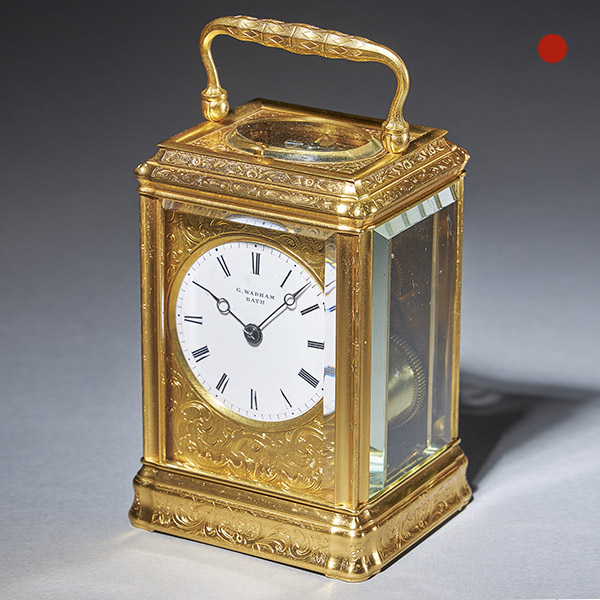
19th Century Gilt-Brass Engraved Striking and Repeating Carriage Clock
19th Century Gilt-Brass Engraved Striking and Repeating Carriage Clock Sold Follow Us19th Century Gilt-Brass Engraved Striking and Repeating Carriage Clock The superb engraved gilt brass gorge case has facetted glass panels to all sides so...
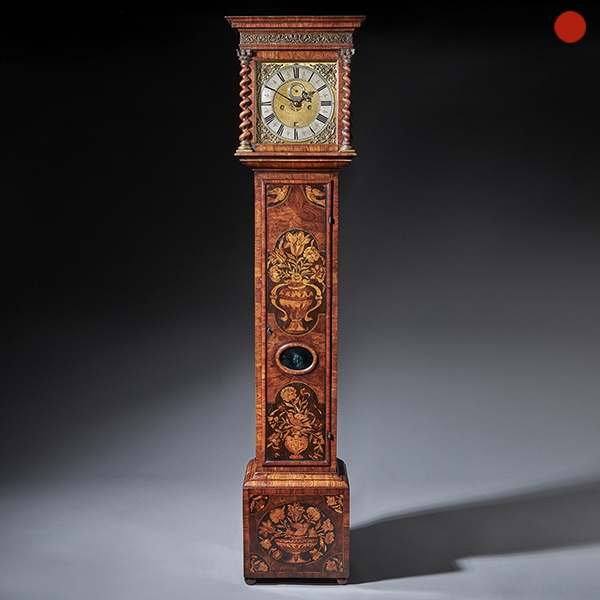
Important Charles II 17th Century Princes Wood and Marquetry Longcase Clock
Important Charles II 17th Century Princes Wood and Marquetry Longcase Clock SOLD Follow UsImportant Charles II 17th Century Princes Wood and Marquetry Longcase Clock A unique and important Charles II 17th century month-going Princes wood and...
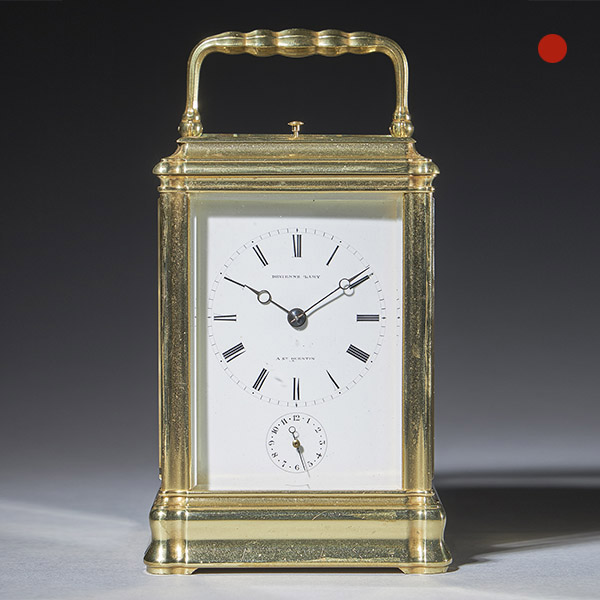
A Rare And Unusual 19th-Century Carriage Clock Signed Devienne Lamy A St Quentin, Circa: 1860
A Rare And Unusual 19th-Century Carriage Clock Signed Devienne Lamy A St Quentin, circa 1860. The gorge case has bevelled glass panels on all sides.
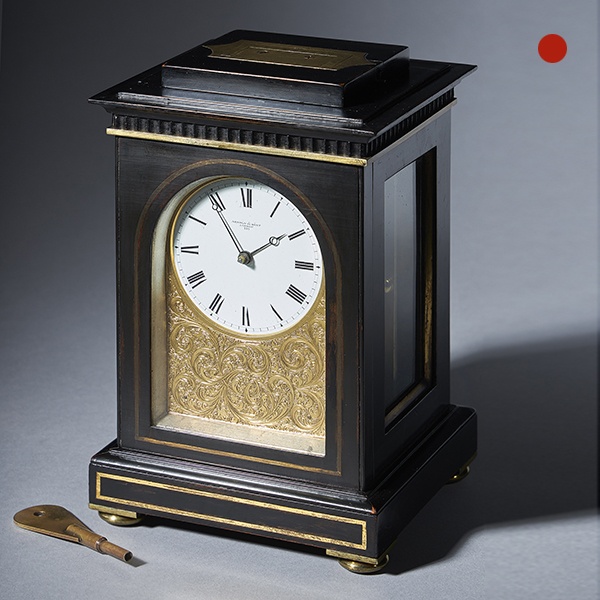
A Unique And Fine Mid 19th-Century Travelling Clock By Celebrated Makers Arnold & Dent, London
Unique and Fine Mid 19th-Century Travelling Clock By Celebrated Makers Arnold & Dent, London. The time is indicated by a fine pair of blued-steel Breguet hands.
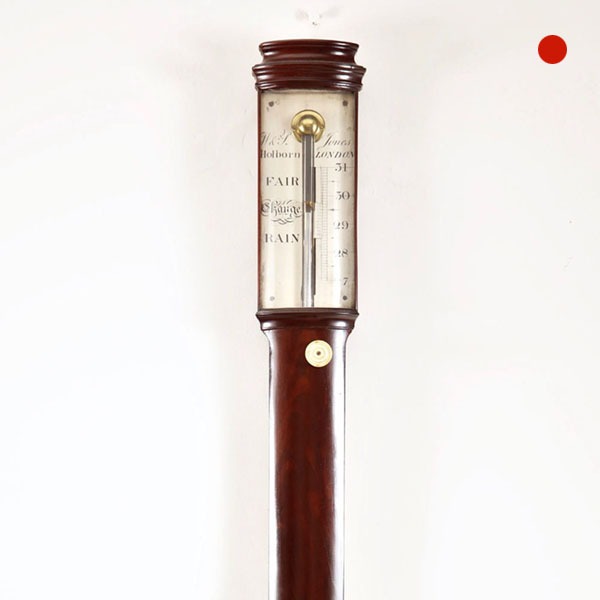
A fine 18th-Century George III mahogany bow-front stick barometer
The mahogany-veneered case has an austere form with only the moulded caddy top and the urn-shaped cistern cover to break its soberness. The silvered register plates are protected by a bowed glass, the recorder with vernier scale being operated by a knob below the register plate.
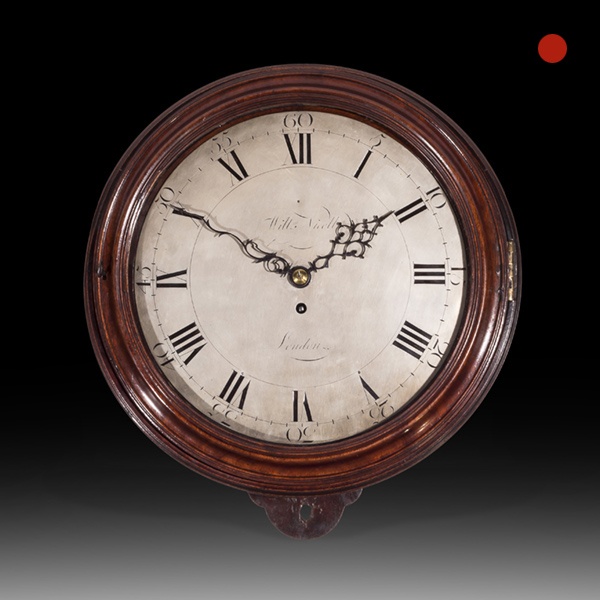
Large Mahogany 18th-Century Dial Clock, William Nicoll, London
The solid mahogany case has a moulded mahogany glazed door, which can be locked on the left-hand side. The original rectangular saltbox is permanently attached to the front and has doors to the side and the bottom.

19th Century Gilt-Brass Engraved Striking and Repeating Carriage Clock
19th Century Gilt-Brass Engraved Striking and Repeating Carriage Clock Sold Follow Us19th Century Gilt-Brass Engraved Striking and Repeating Carriage Clock The superb engraved gilt brass gorge case has facetted glass panels to all sides so...

Important Charles II 17th Century Princes Wood and Marquetry Longcase Clock
Important Charles II 17th Century Princes Wood and Marquetry Longcase Clock SOLD Follow UsImportant Charles II 17th Century Princes Wood and Marquetry Longcase Clock A unique and important Charles II 17th century month-going Princes wood and...

A Rare And Unusual 19th-Century Carriage Clock Signed Devienne Lamy A St Quentin, Circa: 1860
A Rare And Unusual 19th-Century Carriage Clock Signed Devienne Lamy A St Quentin, circa 1860. The gorge case has bevelled glass panels on all sides.

A Unique And Fine Mid 19th-Century Travelling Clock By Celebrated Makers Arnold & Dent, London
Unique and Fine Mid 19th-Century Travelling Clock By Celebrated Makers Arnold & Dent, London. The time is indicated by a fine pair of blued-steel Breguet hands.

A fine 18th-Century George III mahogany bow-front stick barometer
The mahogany-veneered case has an austere form with only the moulded caddy top and the urn-shaped cistern cover to break its soberness. The silvered register plates are protected by a bowed glass, the recorder with vernier scale being operated by a knob below the register plate.

Large Mahogany 18th-Century Dial Clock, William Nicoll, London
The solid mahogany case has a moulded mahogany glazed door, which can be locked on the left-hand side. The original rectangular saltbox is permanently attached to the front and has doors to the side and the bottom.
YOU MAY ALSO LIKE
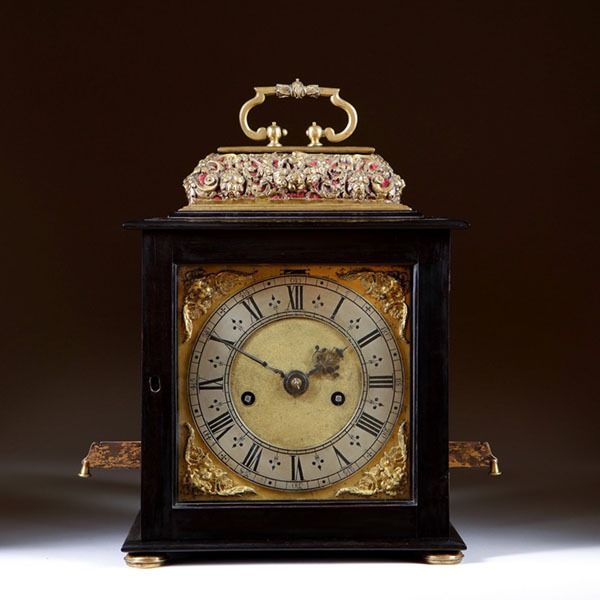
A Rare and Important Charles II 17th Century Table Clock by Henry Jones
A Rare and Important Charles II 17th Century Table Clock by Henry Jones £85,000Follow UsA Rare and...
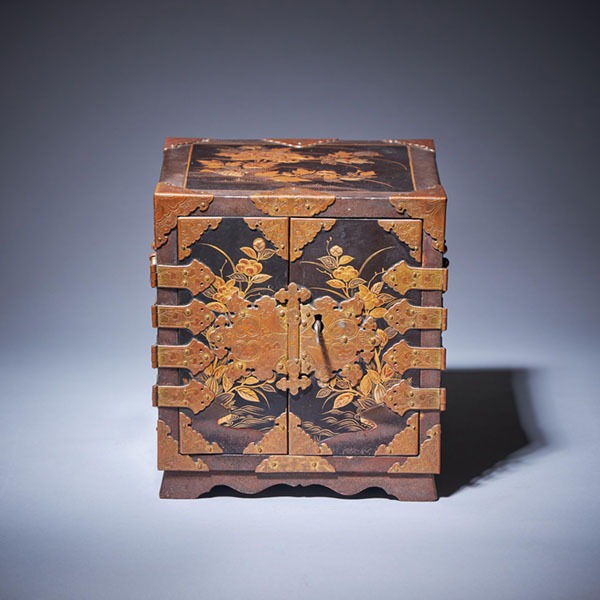
Important Early Edo Period 17th Century Miniature Japanese Lacquer Cabinet
Important Early Edo Period 17th Century Miniature Japanese Lacquer Cabinet £36,000Follow...
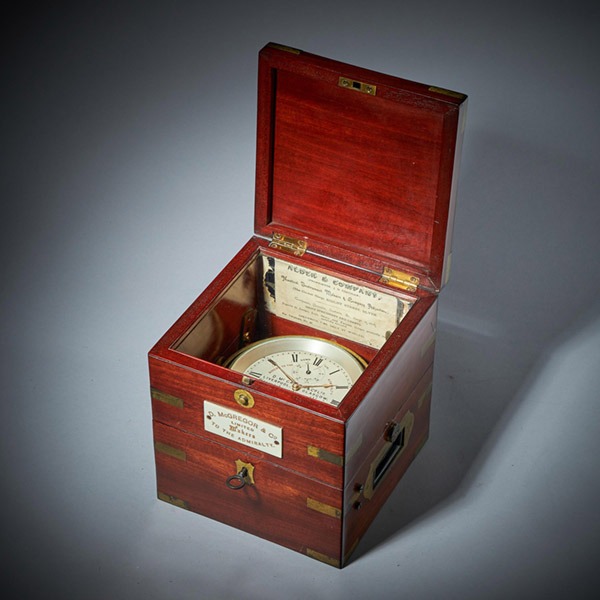
Fine Scottish Two-Day Marine Chronometer Signed and Numbered D. McGregor
Fine Scottish Two-Day Marine Chronometer Signed and Numbered D. McGregor £6,500Follow UsFine...
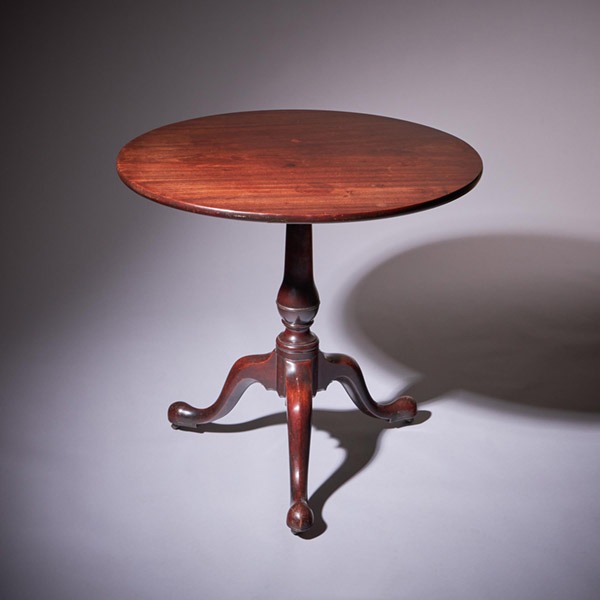
18th Century George III Mahogany Tripod Table, Circa 1770
18th Century George III Mahogany Tripod Table, Circa 1770 £2,200Follow Us18th Century George III...
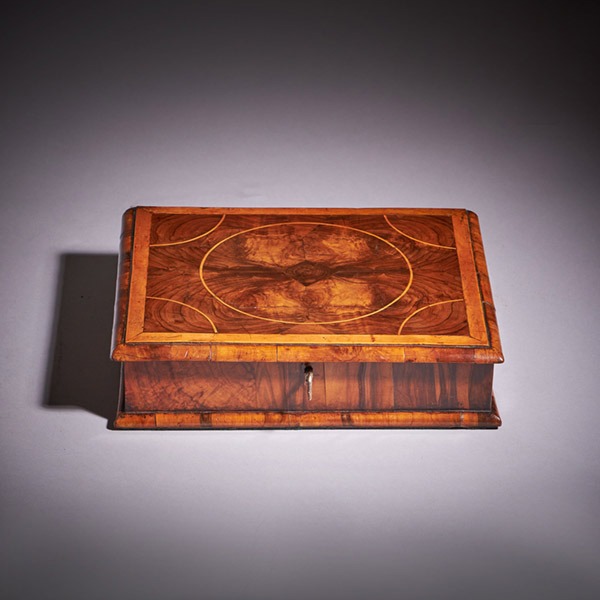
Fine William and Mary 17th Century Olive Oyster Lace Box
Fine William and Mary 17th Century Olive Oyster Lace Box £2,600Follow UsFine William and Mary 17th...
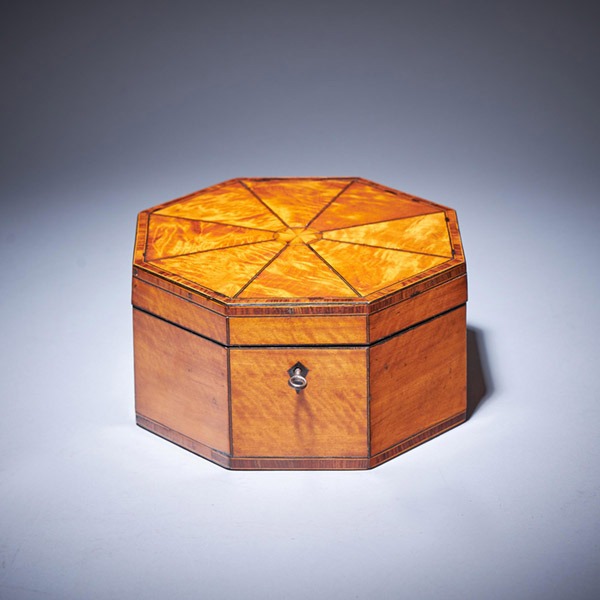
A Fine and Rare George III Octagonal Figured Satinwood Box, C.1790
A Fine and Rare George III Octagonal Figured Satinwood Box, C.1790 £2,200Follow UsA Fine and Rare...

A Rare and Important Charles II 17th Century Table Clock by Henry Jones
A Rare and Important Charles II 17th Century Table Clock by Henry Jones £85,000Follow UsA Rare and...

Important Early Edo Period 17th Century Miniature Japanese Lacquer Cabinet
Important Early Edo Period 17th Century Miniature Japanese Lacquer Cabinet £36,000Follow...

Fine Scottish Two-Day Marine Chronometer Signed and Numbered D. McGregor
Fine Scottish Two-Day Marine Chronometer Signed and Numbered D. McGregor £6,500Follow UsFine...

18th Century George III Mahogany Tripod Table, Circa 1770
18th Century George III Mahogany Tripod Table, Circa 1770 £2,200Follow Us18th Century George III...

Fine William and Mary 17th Century Olive Oyster Lace Box
Fine William and Mary 17th Century Olive Oyster Lace Box £2,600Follow UsFine William and Mary 17th...

A Fine and Rare George III Octagonal Figured Satinwood Box, C.1790
A Fine and Rare George III Octagonal Figured Satinwood Box, C.1790 £2,200Follow UsA Fine and Rare...
